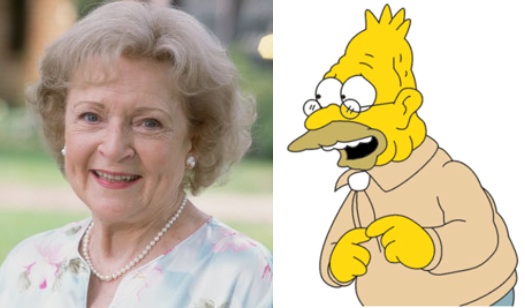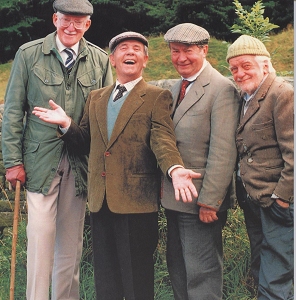Why So Young, Network TV?
Tonight, the always-awesome Betty White hosts Saturday Night Live. White’s role is in large part thanks to the Facebook group “Betty White to Host SNL (please?)!” which at last count had 507,998 fans. In other words, she’s not there because NBC and SNL decided on their own volition that it would be great to have a host who is 5.5 times as old as Justin Bieber. But why not? What’s wrong with having old people on network television?
It’s a question which White’s Boston Legal character Catherine Piper asked in the Season 5 episode, “Juiced,” in which she aims to sue the TV networks for not programming for senior citizens. The episode came after it was well-known that Boston Legal would not return for another year, and it self-referentially mourned its imminent passing as the only network show with multiple central cast members over 50. As Piper complains:
We’re just shoved aside as a nuisance. I can’t even watch television shows, for God’s sake, because the networks consider me irrelevant. You’d think they don’t program for anybody over 50. Is it any wonder I’m out knocking over convenience stores?
Of course, she’s right (what, you doubted Betty White?!). The Nielsen demo that matters most to network TV is 18-49. Let’s put that into context, courtesy of the Census’ 2010 Statistical Abstract, which tells us that in 2008, 73.9 Million Americans were under 18, while 94 Million were 50 and over. In other words, the demo that matters to the networks represents only 45% of the population, while the one that they really don’t give a damn about represents almost a third of the population.
Why? In part because the market in audiences pays top dollar for harder-to-get audiences (i.e.: young men), in part because of an antiquated notion that old people don’t have much expendable income and can’t be moved by ads to change their long-held brand loyalties. I’ve yet to read anywhere that the latter has been proven since Betty White was my age, and instead it seems to be yet another example of what Timothy Havens calls “industry lore,” assumed yet baseless truths that calcify over years in Hollywood.
But it doesn’t have to be this way. I invite anyone who thinks otherwise to take a trip to England. I once bet my father that you couldn’t go a day without seeing something nostalgic on one of the UK’s five terrestrial channels about World War II, clearly aimed at an audience who had been alive and well back then; he took me up on the bet, and proved me wrong … but only after three and a half weeks. Gardening programs make it into prime time, shows about antiques, and shows with old people in love. The visibility of senior citizens on Brit TV isn’t simply limited to sixty year-old guys with twenty year-old girlfriends, either: there are older women, and entire communities of old people. Brit TV looks like another planet for many Americans as a result.
So I’m excited to see Betty White, but disheartened that she’s almost in a category of her own. It’s also not surprising to hear that a whole slate of other guests may crowd her out (as Myles McNutt discusses here). Ours is a television system that is so hostile to the notion of being responsive to older people beyond playing older shows in syndication. Even the soaps are abandoning older viewers.
On one hand, I want to cynically note that White’s only got this hosting gig in the first place because a bunch of 18-49 year-olds demanded it. But on the other hand, I wish Hollywood would note that even that/my age group can get behind 88 year-olds. One of the White/SNL promos sees her seemingly joking about wanting to host the Academy Awards, but how about we go one better and demand she gets her own TV show (and not just a talk show), 61 years after The Betty White Show first premiered?





I keep getting press releases about it, so I do know that White IS returning to television…on cable, and nostalgia-oriented cable at that, on TV Land’s “Hot in Cleveland,” also starring Wendie Malick, Valerine Bertinelli and Jane Leeves.
From said press release:
““Hot In Cleveland” revolves around three fabulous best friends from LA – novelist Melanie Moretti (Bertinelli), eye-brow archer to the stars Joy Scroggs (Leeves) and former soap star Victoria Chase (Malick) – who find their lives changed forever when their plane, headed for Paris, makes an unexpected landing. When the friends discover that they are hot in Cleveland, they decide to stay. Starting over, they rent a house that happens to come with a very feisty caretaker (White).”
Obviously, TV Land is not NBC and actually caters to older demographics, but they’re buying adspace during tonight’s show, so they’re clearly trying to use this as an opportunity to appeal to more young demographics who might want to follow White to her next project.
Maybe I’m wrong, but she sounds like a supporting character there, Myles. So yeah, better than nothing, and I’m happy to see her get more work, but what I’d really like to see is older folk as stars. I’m sure some older viewers would be happy, and I’d love to see the likes of Fred Willard and Swoosie Kurtz get regular starring gigs, not just sidekick status or as guests on Chuck.
I’d call it a glorified cameo, if I had to label it based on what I’ve read, so your point certainly still stands (not that I was attempting to knock it down).
And to be fair to the show, the three stars of the show are outside of the demo (Malick is 60, while Bertinelli and Leeves are 50/49), so they are doing their part even with White in a marginal role.
I’m so looking forward to seeing White tonight; I haven’t tuned in to SNL since the ’90s (well, I suppose I did watch Tina Fey a couple of weeks ago, but that’s about it).
I’m not sure if you subscribe to EW, but this week’s issue featured a nice article on White. The pictures themselves are enough to draw you in: http://www.ew.com/ew/gallery/0,,20316039,00.html
PS. Any time I get to read an excerpt from BOSTON LEGAL, my day is made. Thanks! So many excellent self-referential lines in that show. Denny Crane, Denny Crane. =)
Great post, Jonathan. The construction of audiences and lack of programming “targeted” to a demographic over 55 is something I’ve thought about and wrestled with, too (as someone who’s fascinated with the likes of Justin Bieber). I have a some thoughts on the issue, but none that I can articulate coherently in the middle of wrapping up the semester (damn you, seminar papers!). I would, however, just like to throw in a little reminder that there is, of course, a difference between representations of people over 55 and programming “for” those over 55, not to mention what actual individuals in that part of their life might actually want to watch and enjoy. Also, what *is* currently on the air in terms of an older generation seems to be mostly a white experience. Let’s problematize this notion of representation and just what programming “for” any given demographic is and/or might be. 🙂
Also, having said that, I have two words for you: Sunset Daze. Enjoy!
http://www.nytimes.com/2010/04/27/arts/television/27daze.html
Good points, Lindsay, and I don’t mean to suggest that older viewers can’t get into shows with young’uns in them. Cable news, too, of course, is designed wholly for the over 55 set.
But I worry that Hollywood can at times too easily excuse its bad casting practices by saying that “everyone” can engage with yet another petite blond 23 year-old, for instance. I invoke Havens’s concept of “industry lore” above, and he proposes that in the context of discussing how Hollywood believes that African-American programming doesn’t sell well around the world … as if everyone, black, white, or otherwise, could engage with a white family, but not a black family. The irony is that several shows with African Americans have done very well overseas. Hollywood seems to be in a similar bind here — they no doubt think that older viewers prefer, or can at least get behind, shows with lotsa young folk in them, so they don’t feel that casting older people is all that necessary, while young viewers (as evident with the White campaign, with Golden Girls’ continued popularity, or in worship for George Costanza’s parents) may actually appreciate older cast members. Young becomes a form of whiteness — the norm that supposedly everyone can get behind, and that marginalizes age in the process just as non-white racial “others” are similarly marginalized.
Great article. I’ll be tuning in as well. This reminds me of a great passage in Don DeLillo’s _White Noise_. Murray tells Jack about a discussion he has with his students (presumably in their early 20s):
“‘Even as we sit here,’ I tell them, ‘you are spinning out from the core, becoming less recognizable as a group, less targetable by advertisers and mass-producers of culture. Kids are a true universal. But you’re well beyond that, already beginning to drift, to feel estranged from the products you consume. Who are they designed for? What is your place in the marketing scheme? Once you’re out of school, it is only a matter of time before you experience the vast loneliness and dissatisfaction of consumers who have lost their group identity.’ Then I tap my pencil on the table to indicate time passing ominously.”